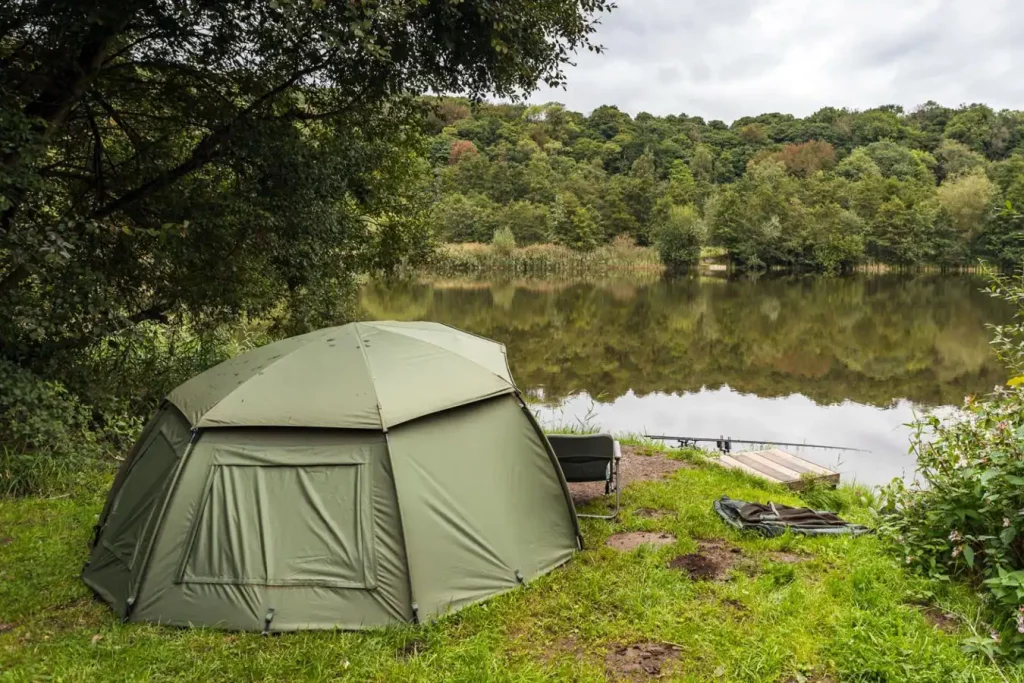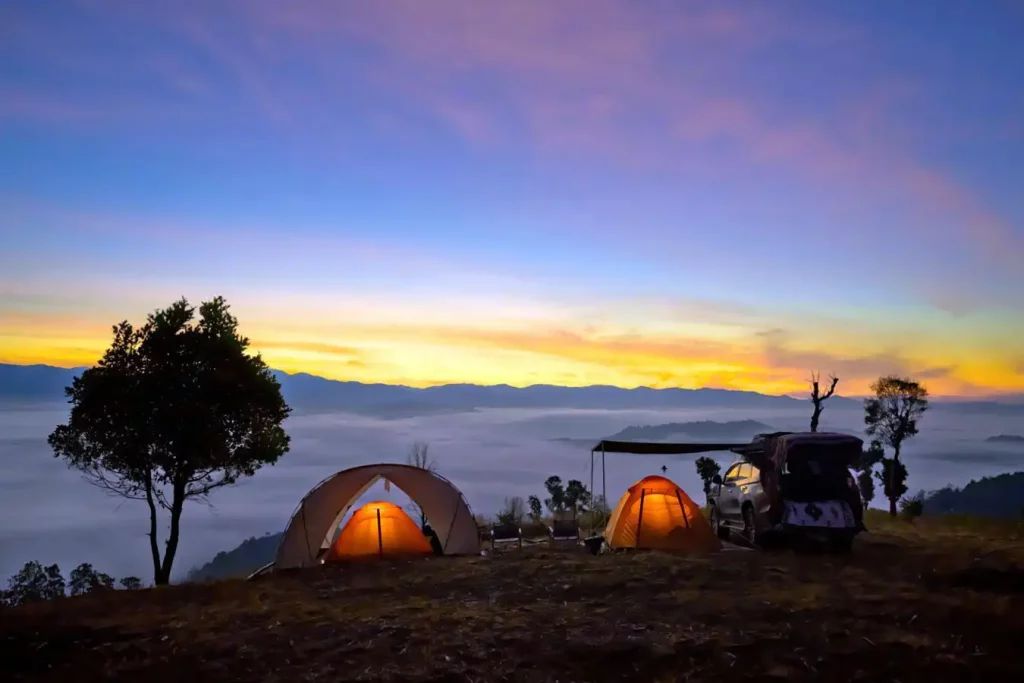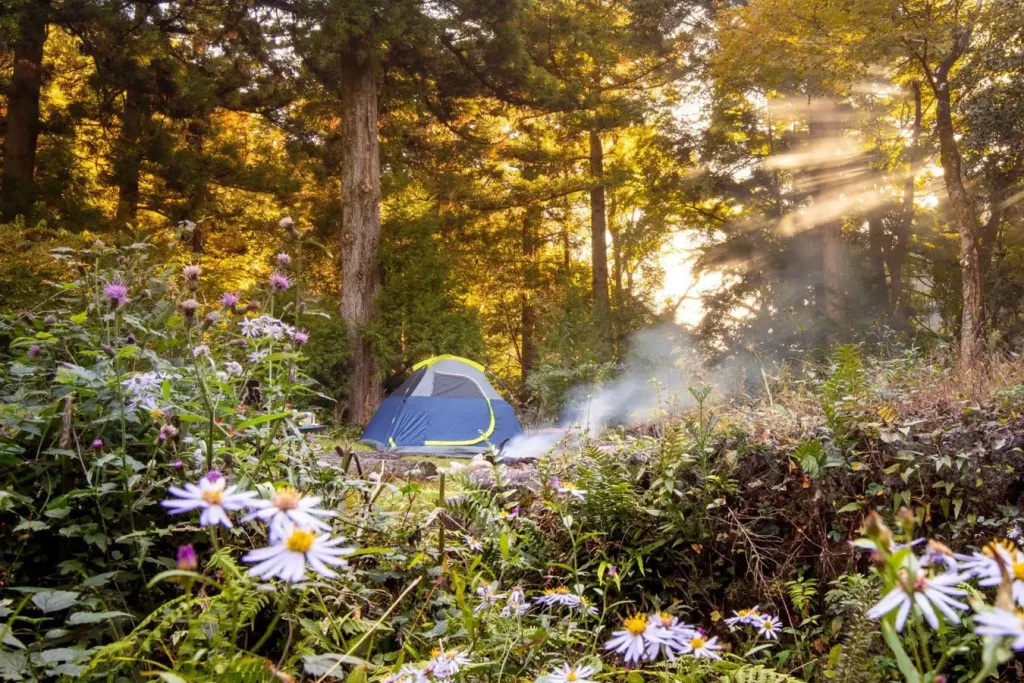When is the best time to go camping? That’s a question every outdoor enthusiast has asked at least once.
With the seasons changing and nature beckoning, the answer might surprise you.
Let’s look into the perspectives of seasoned outdoor experts to determine the best time to pack your tent and hit the trails.
Deciding Your Camping Purpose
Before we dive into the specifics of when the best time to go camping is, it’s essential to understand that the “best time” can largely depend on what you’re hoping to get out of your camping experience.
Are you eager to witness a spectrum of wildlife? Are you interested in outdoor adventure activities? Or is it about spending quality time with your loved ones? Let’s break this down a bit.
Enjoyment of the Great Outdoors and Wildlife
If your primary purpose is to soak up the wonders of nature and engage with a variety of wildlife, spring and early fall are often the most rewarding times to go camping. During these periods, the weather is generally mild, flowers are in bloom, and wildlife is usually more active.
Imagine waking up on a cool spring morning with a symphony of birds serenading you, or catching a glimpse of a deer and her fawns during the quiet moments of dawn. Alternatively, consider the vibrant fall colors and the crisp, clean air on a late September day in the woods. The sight of squirrels bustling about, preparing for winter, can be a joyful spectacle in itself.
Adventure Activities: Hiking, Fishing, etc.
For those adrenaline-seekers interested in adventure activities such as hiking, fishing, or even rafting, the best time to go camping might differ. Summer offers long, sunny days perfect for hiking and other activities. Rivers and lakes are also usually at their most approachable during the summer months.
Picture yourself on a warm summer day, hiking up a trail that meanders through a dense forest. You finally reach the summit, and the breathtaking view of the valley below makes every step worth it. Later, you cast your line in a nearby river, the sun warming your skin as you wait for a fish to bite. These moments are summer camping at its finest.
Family Time and Building Relationships
Family camping trips aimed at fostering relationships and making memories might be best planned for the summer months when school’s out, and you can dedicate plenty of time without worrying about homework or school projects. Campgrounds also tend to organize special activities during the summer months, which can be a great source of fun and entertainment for kids.
Envision a family game night in the middle of the woods, with laughter echoing into the quiet night. Or an afternoon spent learning to pitch a tent together, a team effort that results in a safe and cozy shelter for the night. Such experiences can strengthen bonds and create memories that last a lifetime.
Understanding Seasons for Camping
The season in which you choose to camp can drastically affect your experience. Each season has its unique allure and challenges that can either enhance or diminish your outdoor experience. Let’s explore what each season brings to your camping adventure.

Spring: Pros and Cons
Spring is a magical time to go camping. It’s the season when nature comes back to life with blooming flowers, chirping birds, and longer daylight hours. The temperatures are generally mild, and the rush of summer campers has not yet begun, which often means quieter campsites.
However, with spring comes unpredictable weather patterns. One moment it could be sunny and warm, the next, a sudden shower could dampen your plans. It’s also worth noting that certain areas can be particularly muddy in the spring as the ground thaws from winter.
Summer: Pros and Cons
Summer is the most popular time to camp, and with good reason. The weather is consistently warm, which opens up a plethora of outdoor activities, from swimming and fishing to hiking and biking. The long days also mean more daylight hours to enjoy your surroundings.
On the flip side, popular campsites can get crowded during the summer months. In some regions, summer also brings bugs and heatwaves, which can prove to be a nuisance or even dangerous if you’re not prepared.
Autumn: Pros and Cons
Autumn offers a spectacular display of fall foliage, making it a beautiful time for camping. The weather is typically cooler and more stable than spring, yet still comfortable for most outdoor activities. Wildlife activity is also often high during this time as animals prepare for the coming winter.
However, the days start to get shorter, which means less daylight for activities. Nights can get chilly, and an unprepared camper might find them quite cold.

Read more: Places to Visit in Michigan in the Fall
Winter: Pros and Cons
Winter camping is an entirely different beast. The landscape is serene, covered in a blanket of snow, and the campsites are less crowded. For the adventurous, winter sports like snowshoeing or cross-country skiing can be added to the camping experience.
The main downside to winter camping is, of course, the cold. It requires a significant amount of preparation and gear to stay safe and comfortable. Moreover, many campsites close during the winter, limiting your options.
To know more: Stay Warm Camping in 30 Degree Weather
Factors to Consider When Choosing the Best Time to Camp
Deciding the best time to go camping is not a one-size-fits-all answer. Several factors come into play that can influence your decision.
Weather and Climate Conditions
The weather and climate conditions significantly influence the camping experience. It’s crucial to research the typical conditions for the time of year you plan to camp. You don’t want to be caught in a summer heatwave without ample shade or water, or a winter snowstorm without appropriate gear.
Campsite Availability
The popularity of the camping season can affect the availability of campsites. If you’re planning to camp during the peak summer months, it’s advisable to book your campsite well in advance. On the other hand, off-peak seasons might offer more choices with less crowd.
Personal Comfort and Preferences
Your personal comfort and preferences are essential. Some people thrive in the brisk cold and solitude of winter camping, while others prefer the warm, bustling atmosphere of summer camping. It’s vital to align your camping trip with your comfort levels and what you enjoy doing.
Wildlife Activity
If observing wildlife is a primary goal of your camping trip, you’ll want to research when wildlife is most active in your chosen area. Some animals are more active during specific seasons or times of day, so aligning your trip with these times can enhance your chances of wildlife sightings.
Benefits and Drawbacks of Camping in Different Seasons
Camping in each season comes with its own set of benefits and drawbacks. Understanding these can help you plan your camping trip in a way that maximizes your enjoyment and minimizes any potential difficulties.
Pros and Cons of Spring Camping
Spring camping offers the beauty of nature reawakening. With temperatures warming up, there are also fewer bugs to bother you, and campsites are less crowded.
On the other hand, unpredictable weather can be a downside to spring camping. Rain showers can come and go unexpectedly, and nights can still be quite chilly. Also, in some regions, the melting snow can make certain trails muddy and hard to traverse.
Pros and Cons of Summer Camping
Summer camping means long, sunny days ideal for a myriad of outdoor activities. It’s the perfect time for swimming, fishing, and sunbathing.
However, summer camping also means dealing with crowds, especially in popular camping spots. The weather can also be excessively hot in certain areas, and bugs like mosquitoes and ticks are at their peak.
Pros and Cons of Autumn Camping
Autumn camping offers moderate temperatures, fewer bugs, and less crowded campsites. The changing foliage provides a stunning backdrop for your outdoor adventure.
The downside to autumn camping includes shorter days, meaning less daylight for activities. Additionally, temperatures can drop significantly at night, which might require warmer clothing and gear.
Pros and Cons of Winter Camping
Winter camping provides a unique experience with serene, snow-covered landscapes and opportunities for winter sports like skiing and snowshoeing.
However, winter camping can be challenging due to the freezing temperatures. It requires more gear, preparation, and survival skills to ensure safety. Also, many campsites and trails may be closed during this season.
Key Events and Festivals for Campers
Incorporating key events and festivals into your camping trip can add an extra layer of fun and excitement to your adventure.
Camping during Special Occasions and Festivals
Many campers love aligning their camping trips with special occasions or local festivals. These events can range from music and art festivals to national park anniversary celebrations or nature-centric events like bird watching festivals.
Camping during a special occasion can turn an ordinary camping trip into a memorable experience. Imagine watching the Fourth of July fireworks from the comfort of your campsite or participating in a community potluck at a local Harvest Festival.
However, keep in mind that camping during these times can also mean more crowded campsites and potentially higher fees. It’s recommended to book your campsite well in advance during these popular events.
Special Considerations for Camping During Off-Peak Times
While camping during off-peak times might not be the typical choice for many, it certainly has its unique attractions. From the tranquillity of the campgrounds to the raw beauty of nature, off-peak camping can be quite an experience. However, it does require some special considerations.
Tips for Camping in the Off-Season
Off-season camping provides a level of solitude and tranquillity that’s harder to find during the peak season. Here are a few tips to make the most of it:
- Dress in layers: The weather can be unpredictable, so dressing in layers will help you stay comfortable regardless of the temperature swings.
- Arrive early: Shorter days mean less daylight, so arrive early to set up camp while it’s still light.
- Plan your meals: Some campground services might be closed, so plan your meals accordingly and pack extra supplies.
- Know your limits: Off-season camping can be more challenging, especially in harsh weather conditions. Know your limits and always prioritize safety.
Preparing for Unexpected Weather Conditions
Camping in the off-peak season might bring you face to face with unexpected weather conditions. Here are a few tips to prepare:
- Check the weather forecast: Regularly check the forecast leading up to your trip and plan your gear accordingly.
- Pack for all conditions: From waterproof clothing to extra blankets for cold nights, be prepared for anything.
- Carry emergency equipment: A first aid kit, multi-tool, waterproof matches, and a flashlight are just some of the emergency items you should pack.
Read more: Winter Camping Basics
Expert Recommendations on the Best Times to Go Camping
What better way to wrap up our guide than with insights from those who’ve spent countless nights under the stars?
Insights from Experienced Campers and Guides
Many experienced campers and guides agree that the best time to go camping really depends on what you’re looking for. If you’re seeking solitude, the off-peak seasons of spring and autumn can be ideal. Summer is great for water activities and family trips, while winter camping offers a unique challenge for those seeking adventure.
Most importantly, they stress the need for preparation. Understanding the conditions of your chosen campsite and packing appropriately can make all the difference.
Ultimately, the best time to go camping is typically late spring through early fall, depending on your location and preferences, as these periods offer favorable weather and outdoor conditions for various camping activities.
Know more: Backpacking Vs Camping
FAQs about When Does Camping Season Start
What time of year is best to start camping?
The ideal time to start camping largely depends on your preferences and your location. However, spring is often a great time as the weather is mild, nature is coming alive, and campgrounds are less crowded than in summer.
What are the best months to go tent camping?
For most regions, the best months for tent camping are from late spring to early autumn, usually May through September. These months typically offer the best weather conditions for outdoor activities and sleeping in a tent.
When can you start camping in Colorado?
When can you camp in Arizona?
Final Thoughts about Best Time to Go Camping
Whether you’re a weekend warrior or a dedicated outdoor enthusiast, deciding when to go camping should be about more than just the weather. It’s about balancing your desire for adventure with your comfort levels, personal interests, and the experiences you want to have.
So, when is the best time to go camping? Anytime you feel the pull of the outdoors, the yearning for starlit skies, the call of the wild, or the need to connect with loved ones around a campfire.
Remember, every camping trip, regardless of the season or weather, holds the promise of unforgettable memories. So go forth and explore. Happy camping!


